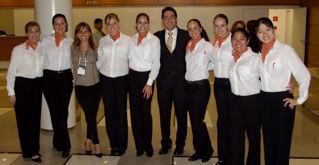My business is in Diabetes Care (products more than services). Last year, we started exploring innovative ways of providing a much better diabetes education as a way to differentiate ourselves from the competition. One of the key questions was: what profile should our diabetes educators have?
It was around that time when I did the StrengthsFinder myself for the first time and soon also invited my managers to do it. We were all so fascinated with the outcome that we could not help thinking in terms of (the StrengthsFinder) talents when we tried to define the ideal profile of our diabetes educators.
However, Gallup does not recommend using the StrengthsFinder (or its 34 talent themes) as a selection tool, as it is supposed to be a tool for self-understanding and coaching. I confess that I could not quite understand this in the beginning as I was (and still am) so convinced of the connection between talents and performance.
But over time, I understood why it would not be a good idea indeed to select for talent: because talents (according to the definition of the Gallup books) are more of a "raw material", not necessarily of great use for a business yet. Talents often need to be developed into productive strengths through targeted practice, repetition, experience. And that takes time, sometimes a lot of time; time which you usually don't have as a manager trying to hit the road running with a new strategy.
Let me give you an example: let's say you you are in a business that sells mostly to mid-sized business, often run by the owner himself. You come to the conclusion that your sales force is too conventional, too much product- and relationship oriented. You believe that you sales force needs to become more service- and solution-oriented; a true business partner with a profound knowledge of the customer's industry trends and needs.
That may require quite some strategic and entrepreneurial thinking. If you would limit your new profile to the StrengthsFinder talent themes, you may come up with talents like Strategic, Ideation, Futuristic. But recruiting for these talents only is no guarantee that a sales rep will have the desired level of entrepreneurial thinking, as this kind of strength may require many other elements, such as industry experience, some management training, product knowledge.
So you are much better off recruiting directly for the strengths you need, in this case entrepreneurial thinking or business acumen good enough to be a real business partner of your customers.
The other important disadvantage of recruiting for (the StrengthsFinder) talents is that different talents can result in a similar strength: for instance, for a Diabetes educator, the strength to adapt a recommendation to a customer's unique personality and situation is of tantamount importance. The obvious StrengthsFinder talent for this is Individualization, but I have also found some people with Connectedness and Empathy very good in this. If I selected only for Individualization, I would miss interesting candidates with Connectedness and Empathy.
So eventually, I got convinced of selecting for strengths, not for talents. But which strengths? The beautiful thing of the StrengthsFinder is that it offers you a nice taxonomy of 34 talents along with the vocabulary so that you can speak the same language with your managers. But when we started to talk about strengths, we found ourself lost in a similar way as we did with talents before learning about the StrengthsFinder. My team and I had a hard time spelling out what strengths we were really looking for and inevitably resorted again and again to using the talent themes vocabulary.
Soon, I decided to ask Gallup for help. They use a system called SRI. I forgot what the abbreviation stands for. The SRI makes use of what is probably Gallup's biggest strength: asking intelligent questions to lots of people and drawing important conclusions from the answers. So what they usually would do is to interview 100 or more of your employees who do the job for which you want to create the strengths profile. And with your help, they identify the high performers in this group of 100 (or more). Then they would compare the answers of the high performers with the rest of the group to find out whether there are certain questions that the high performers consistently answer differently than the rest of the group. A nice example is written in the book "Discover Your Sales Strengths": if you ask sales people the question how they feel when clients doubt what they say, the high performers feel bothered, while the mediocre or underperforming sales people would say that they don't bother.
I am a layman with such interviewing, or quantitative or qualitative research, but I find this approach most interesting. However, I also see some problems:
- First of all, Gallup is everything else than cheap and so usually only large companies can afford this SRI.
- But apart from the cost, the fact that you need a larger number of people to interview also makes it difficult for smaller companies to do an SRI. If you have your own small business or are a manager of a smaller business unit in a large company, you may not have 100 employees and at least 20 high performers.
- And even if you are a large company or have 100 employees, you still may have a problem when you realize that things are not going well and that the root cause of this is a mismatch between the strengths of your employees and what the company really needs. In such a situation, you want to define the strengths required for the company’s new strategy or vision, but how do you do this if few of your existing employees seem to have these strengths? The SRI won’t help you here.
- A similar problem can occur if you want to develop an innovative new service, something that has not been done before in your company. That was my case with the Diabetes educators. But I didn’t have any Diabetes educators with whom we could do an SRI! So what do you then?
Gallup was very forthcoming in finding a solution to my needs, also because they were intrigued by the idea of improving diabetes education; but they pointed out that they had to adapt and improvise in order to come up with a solution.
Ever since, I have been thinking about ways how small companies (or small business units in big companies) can define the strengths that they need for their jobs, their strategy and their culture; especially so if they are in a turn-around situation or want to venture into innovative new fields. This is not an easy job because defining the right strengths does not depend only on the job description, but also on the company's overall strategy and vision, as well as your leadership style. I will explore these issues in more detail in the next post.
I have been searching the literature for something like a taxonomy of strengths. I haven't found a lot so far. When I came across the book “FYI – For Your Improvement” by Michael Lombardo and Robert Eichinger, I read with great interest their list of 166 competencies such as “action oriented”, “command skills”, “listening”, “patience” and “humor”. If I understand the strengths literature correctly, the term “competency” is a bit muddled in that it can be talent, strength, knowledge, skill or a blend of them. Still, this list is the closest thing of a strengths taxonomy that I have found so far. I wonder whether anyone of you has experience with this? Do you know of any other "strengths taxonomy" or similar?
Have a look also at these talent-based interview questions of Jay Forte.







3 comments:
A very well thought out approach to strengths. I hope that strengths move people beyond competencies to something more robust, engaged, and powerful. There also may be many pathways to get a "job" done. A person who is strategic may achieve the same result as someone who is a maximizer by using a different pathway. Still the idea of weaving strengths and work is very compelling.
David
Hi
Tks very much for post:
I like it and hope that you continue posting.
Let me show other source that may be good for community.
Source: People manager interview questions
Best rgs
David
This is exactly what we have been working on. Take a look at our site www.strengths-mapper.com
Post a Comment